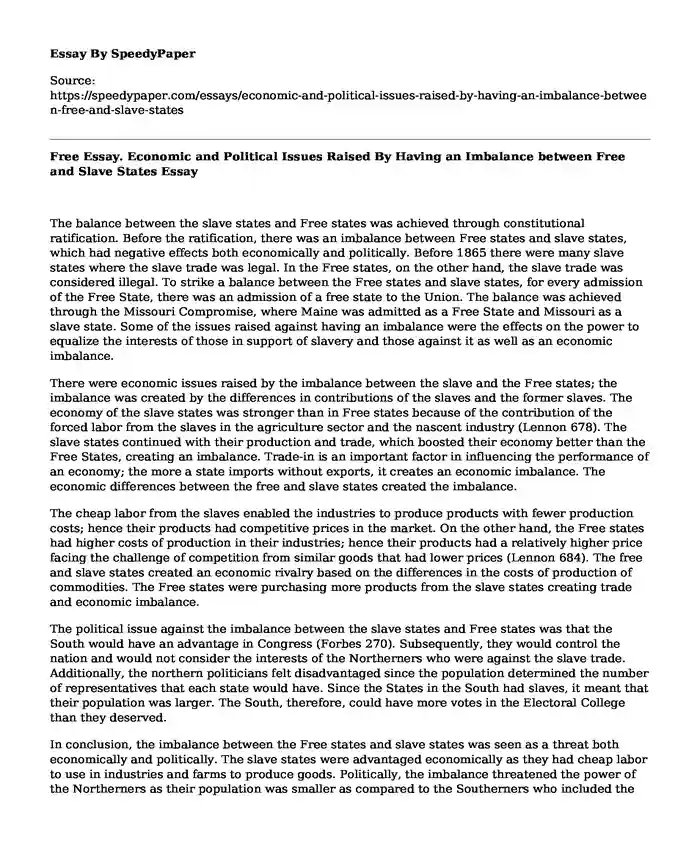
| Type of paper: | Essay |
| Categories: | Politics Economics Slavery American history |
| Pages: | 3 |
| Wordcount: | 647 words |
The balance between the slave states and Free states was achieved through constitutional ratification. Before the ratification, there was an imbalance between Free states and slave states, which had negative effects both economically and politically. Before 1865 there were many slave states where the slave trade was legal. In the Free states, on the other hand, the slave trade was considered illegal. To strike a balance between the Free states and slave states, for every admission of the Free State, there was an admission of a free state to the Union. The balance was achieved through the Missouri Compromise, where Maine was admitted as a Free State and Missouri as a slave state. Some of the issues raised against having an imbalance were the effects on the power to equalize the interests of those in support of slavery and those against it as well as an economic imbalance.
There were economic issues raised by the imbalance between the slave and the Free states; the imbalance was created by the differences in contributions of the slaves and the former slaves. The economy of the slave states was stronger than in Free states because of the contribution of the forced labor from the slaves in the agriculture sector and the nascent industry (Lennon 678). The slave states continued with their production and trade, which boosted their economy better than the Free States, creating an imbalance. Trade-in is an important factor in influencing the performance of an economy; the more a state imports without exports, it creates an economic imbalance. The economic differences between the free and slave states created the imbalance.
The cheap labor from the slaves enabled the industries to produce products with fewer production costs; hence their products had competitive prices in the market. On the other hand, the Free states had higher costs of production in their industries; hence their products had a relatively higher price facing the challenge of competition from similar goods that had lower prices (Lennon 684). The free and slave states created an economic rivalry based on the differences in the costs of production of commodities. The Free states were purchasing more products from the slave states creating trade and economic imbalance.
The political issue against the imbalance between the slave states and Free states was that the South would have an advantage in Congress (Forbes 270). Subsequently, they would control the nation and would not consider the interests of the Northerners who were against the slave trade. Additionally, the northern politicians felt disadvantaged since the population determined the number of representatives that each state would have. Since the States in the South had slaves, it meant that their population was larger. The South, therefore, could have more votes in the Electoral College than they deserved.
In conclusion, the imbalance between the Free states and slave states was seen as a threat both economically and politically. The slave states were advantaged economically as they had cheap labor to use in industries and farms to produce goods. Politically, the imbalance threatened the power of the Northerners as their population was smaller as compared to the Southerners who included the slaves. The slaves, therefore, would make the Southerners more votes in the Electoral College.
The imbalance between the free and the slave states mattered because there were states that were developing more than others, and the slaves were not considered in the ownership of the wealth created (Lennon 691). The disadvantaged states wanted an equal playing field for business, and the slaves wanted dignity and freedom through the abolishment of slavery and recognition of their contribution to the economy.
Works Cited
Forbes, Robert Pierce. The Missouri Compromise and its aftermath: Slavery and the Meaning of America. Univ of North Carolina Press, 2009: 268-273.
Lennon, Conor. "Slave escape, prices, and the fugitive slave act of 1850." The Journal of Law and Economics 59.3 (2016): 669-695.
Cite this page
Free Essay. Economic and Political Issues Raised By Having an Imbalance between Free and Slave States. (2023, Jul 13). Retrieved from https://speedypaper.net/essays/economic-and-political-issues-raised-by-having-an-imbalance-between-free-and-slave-states
Request Removal
If you are the original author of this essay and no longer wish to have it published on the SpeedyPaper website, please click below to request its removal:
- Free Essay with the Fusion Centers Research
- Migrant Health - Public Health Research Paper Sample
- Free Essay Example on Australian Politics
- Free Essay Sample on The New Deal and Minorities
- Free Essay with an Economic Analysis of Inflation and Unemployment
- Free Essay Example. Sex, Gender, and Domestic Violence
- Essay on Transformative Learnings in Sociology: A Deeper Understanding of Discrimination and Feminist Theory
Popular categories




